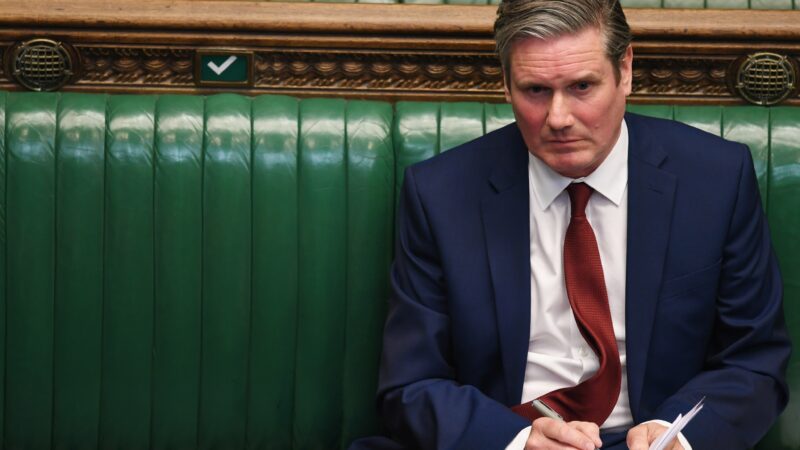
Keir Starmer addressed the nation on television and radio last night, offering a response to the Prime Minister’s Sunday evening broadcast. The Labour leader made clear that the party under his leadership would “always put the national interest first and have the courage to support the government where it gets things right; but challenge it where it gets things wrong”. He called again for a national consensus, assurance and clarity to fight the virus. It was a very courteous statement, despite Britain recording the highest death rate in Europe. It would have been unimaginable under Jeremy Corbyn’s leadership just over a month ago.
Since Starmer’s election as party leader, media commentators and moderate Labour members have celebrated the return of a ‘sensible opposition’. They have praised Starmer for his demeanour at the despatch box and his desire to work together with the government to find solutions. But some members worry that the leadership’s approach has been too soft: LabourList’s latest survey revealed that 62% of readers believed Labour was not critical enough.
This differing approach is rooted in divergent attitudes towards Labour’s role in our parliamentary democracy. Of course, Labour under both Corbyn and Starmer would see winning an election and taking state power as the primary goal. But Corbynism aimed to be more than ‘just’ a traditional party. It saw Labour as a tool to bridge the gap between the institutions of state power (government, parliament) and extra-parliamentary struggles fought through trade unions and social movements.
Rather than just take over the state to use it as an instrument to administer society and manage capitalism, it wanted to ‘transform’ it. This is why Corbynism presented alternatives to government policy, rather than supplement or improve it by making helpful suggestions. It didn’t view politics as an arena to forge consensus but as an opportunity for struggle to force a break with convention. Ultimately, by taking over and transforming the state, democratic socialism could be achieved. This strategy has often been described by thinkers in and around the Labour left as “in and against the state”.
In the UK parliamentary system, power to legislate is de facto highly centralised with the Prime Minister and his cabinet. Traditionally, the role of the opposition party is to closely follow and scrutinise the government’s work. Shadow cabinet members are expected to question their counterparts in the debating chamber to expose policy weaknesses. Cross-party select committees can produce reports and table amendments to bills, but not propose legislation themselves. MPs can introduce Early Day Motions or Private Members Bills, but their chances of success are limited.
Whilst Corbynism represented a break, Starmer’s Labour slots nicely back into convention. This is most evident now over the coronavirus crisis response, but there is little indication that this will change whenever this is over. Some of the key battlegrounds exposed by the virus are directly relevant to class struggle: the Tories are willing to sacrifice working-class people on the altar of profit as they order them back to work without proper health and safety guidance or enforcement.
Labour is also now advocating rent deferrals. (This was initially called for by Corbyn, but he and John McDonnell later appeared to come out in favour of rent suspensions.) The new policy announced over the weekend will especially harm young people and those on low incomes, two groups that are more likely to live in rented accommodation. They will struggle significantly to make up additional housing costs during an economic downturn. Not only would it be the right thing to back vulnerable renters. Labour’s decision to ditch the rent suspension policy also abandons a key constituency for a future electoral coalition. It opens up the fundamental question of who we think we are here to represent.
Starmer’s Labour is siding with those who can reap the benefits of capitalism even in crisis. As Her Majesty’s Most Loyal Opposition, we are expected to fulfil our role in the political realm, which is to help negotiate unity between different parts of the dominant social classes. At worst, this means Labour will side with landlords or small businesses to advocate on their behalf against a Conservative Party that might be more concerned with the needs of the financial sector and multinational corporate giants. At best, this can result in social democratic policies and a mixed market economy. Mediating between capital and labour results in better working conditions or pay policies, but it does not pose a fundamental challenge to the exploitation of labour for profit by bosses.
A Labour Party that once again sees itself as an integral part of the system poses a huge challenge to those who still hope that a Labour government is the first step to transforming the state and society. The question is whether there will be scope to at least influence Team Starmer on policy, if not on strategy. In the meantime, the public’s general view of the government’s handling of the crisis seems to remain favourable. Only time will tell whether consensus politics during a pandemic can pay off electorally.




More from LabourList
Delivering in Government: your weekly round up of good news Labour stories
‘Forgotten fathers: pipefitters, plumbers and the paternity pay gap’
‘How can Britain build peace for Palestinians without owning its own past?’